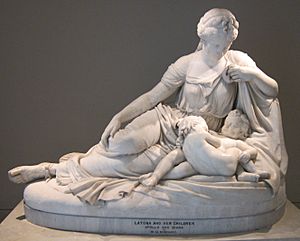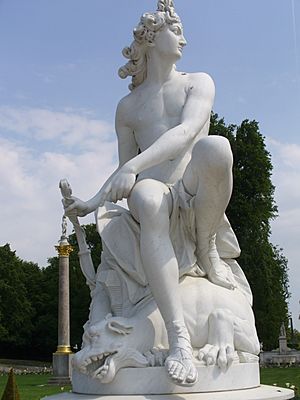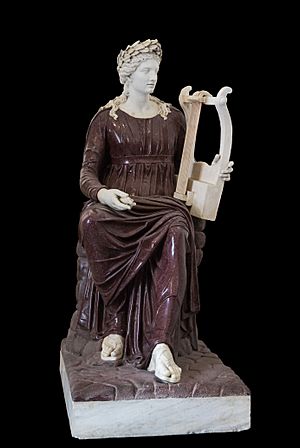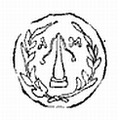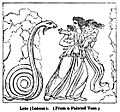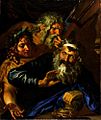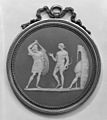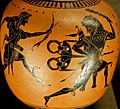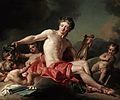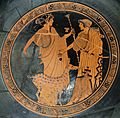Apollo facts for kids
Quick facts for kids Apollo or Apollon |
|
|---|---|
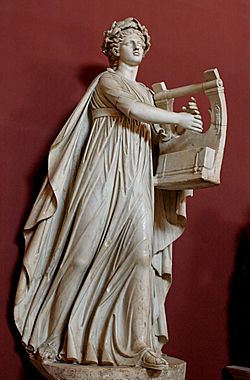 |
|
| Roman equivalent | Apollo |
Apollo is a famous god in Greek mythology. He is one of the Twelve Olympians, the most important gods who lived on Mount Olympus. Apollo is the son of Zeus, the king of the gods, and the goddess Leto. He is also the twin brother of Artemis, the goddess of the hunt.
Apollo is known as the god of many things. He is the god of healing and medicine. He also rules over archery, music, and poetry. People also know him as the god of the sun and prophecy. His special place for telling the future was the Oracle at Delphi, which was very important. Apollo is often shown as a young man. He wears a laurel wreath on his head and plays a musical instrument called a kithara, which is like a lyre. These are his main symbols.
Apollo was very important for health. He could heal people from sickness. But he could also bring illness, like a deadly plague, with his arrows. He and his sister Artemis are even credited with inventing archery. Apollo is usually shown carrying a silver or golden bow and a quiver full of arrows.
He was also a god who protected farmers and shepherds. His job was to keep herds, flocks, and crops safe. He protected them from diseases, pests, and animals that might harm them.
As the god of mousike (which means "arts of the Muses"), Apollo was in charge of all music, songs, dance, and poetry. He was even the leader of the Muses, who were nine goddesses of the arts.
Contents
Cool Stories About Apollo
Apollo was one of the Twelve Olympians. These were the 12 most important gods in Greek mythology. Because he was so important, there are many exciting myths about him.
Apollo's Amazing Birth
Apollo and his twin sister Artemis were the children of Zeus. Zeus was the king of the Greek gods. Their mother was the goddess Leto.
Zeus's wife, Hera, found out that Leto was going to have children. Hera was very angry. She banned Leto from giving birth on any solid land. Leto searched many places for shelter, but everywhere turned her away.
Finally, the voice of unborn Apollo told his mother about a floating island. This island was called Delos. It used to be Leto's own sister, Asteria. Since Delos was not a mainland or a regular island, Leto was welcomed there. She gave birth to her children under a palm tree. Delos then became a special, sacred place for Apollo and Artemis.
When Apollo was born, he held a golden sword. Everything on Delos turned to gold. The island was filled with a sweet, heavenly smell. Swans flew around the island seven times. Nymphs, who are nature spirits, sang with joy. Goddesses washed him clean. They dressed him in white and put golden bands on him. Leto could not feed him. So, Themis, the goddess of divine law, fed him. She gave him nectar, which is a drink of the gods, or ambrosia, the food of the gods.
As soon as he tasted the divine food, Apollo broke free. He declared that he would be a master of the lyre and archery. He also said he would tell humans what Zeus wanted.
Apollo and the Oracle at Delphi
When Apollo grew up, he asked his father Zeus for a golden bow. He also wanted arrows as bright and sharp as sunshine. Then, he went to find a place to build his temple.
He found a spring that belonged to a nymph named Telephusa. He tried to build his temple there. But Telephusa suggested he build it at Delphi instead. There was already a shrine there to Themis, the goddess of telling the future.
Apollo went to Delphi. He found out it was taken over by Python. Python was a huge dragon who had tried to harm his mother. Apollo killed the Python with a hundred arrows. He then claimed Delphi as his own temple. He found two sailors and made them his priests. Then, he gave a girl the power to tell the future. This girl became his priestess, or oracle.
The little god Eros, son of the love goddess Aphrodite, had watched Apollo kill Python. Eros looked up to Apollo. But Apollo was annoyed by Eros and made fun of him. Eros got angry. He shot Apollo with a magic arrow. This arrow made Apollo fall in love with a nymph named Daphne. Daphne did not love Apollo and tried to avoid him. Apollo chased her. To escape him, she turned herself into a laurel tree. Apollo still loved her. He made the laurel tree one of his special symbols.
Apollo and Hermes
Apollo used to look after the cattle of the sun-god Helios. This was while Helios drove the sun across the sky. While Apollo was busy chasing Daphne, the tricky baby god Hermes stole the cattle. Hermes confused Apollo by making the cattle walk backward. So, when Apollo looked for them, it seemed like they had walked into the ranch, not out.
Hermes also told a man nearby that he would make him rich. But only if the man promised not to tell anyone what he saw Hermes do. The man, Battos, told Apollo anyway. Later, Hermes turned Battos into stone as punishment.
Apollo took Hermes in front of all the gods to be judged. Hermes acted innocent. But he finally convinced Apollo to forgive him. He did this by giving Apollo a lyre. Apollo loved this lyre so much! He not only let Hermes keep the cattle but also gave him the caduceus. This was a magic wand that could heal wounds and cause sleep. Hermes tried the caduceus on two dying snakes. They came back to life and wrapped around the wand forever.
Meanwhile, Apollo used his lyre to become the god of music. He became the leader of the Muses, the nine goddesses of the arts.
Special Events and Festivals
The most important festival for Apollo was the Pythian Games. These games were held every four years at Delphi. They were one of the four great Panhellenic Games in ancient Greece. Another very important festival was the Delia. This was also held every four years on the island of Delos, Apollo's birthplace.
Apollo's Symbols
Apollo's most common symbols were his bow and arrow. Other things linked to him included the kithara (a fancy version of the lyre), a plectrum (for playing string instruments), and a sword. Another common symbol was the sacrificial tripod. This showed his power to tell the future. The bay laurel plant was used in sacrifices. Its leaves were also used to make the crown of victory at the Pythian Games.
The palm tree was also sacred to Apollo. This is because he was born under one in Delos. Animals sacred to Apollo included wolves, dolphins, roe deer, swans, and cicadas (which symbolize music). Ravens and hawks were also important. Apollo used hawks and crows as his messengers. Snakes were sacred because Apollo was the god of prophecy. Mice and griffins, which are mythical eagle-lion creatures, were also linked to him.
Images for kids
-
Temple of the Delians at Delos, dedicated to Apollo (478 BC). 19th-century pen-and-wash restoration.
-
The Omphalos in the Museum of Delphi
-
Ornamented golden Minoan labrys
-
Illustration of a coin of Apollo Agyieus from Ambracia
-
Apollo Guards the Herds (or Flocks) of King Admetus, by Felice Gianni
-
Laomedon Refusing Payment to Poseidon and Apollo, by Joachim von Sandrart
-
Apollo preceding Hector with his Aegis, and dispersing the Greeks, by John Flaxman
-
Heracles steals Apollo's tripod, Attic black-figure oinochoe, ca. 520 BC.
-
The friendship of Apollo and Hermes, by Noël Coypel
-
The contest between Apollo and Marsyas by Palma il Giovane
-
Apollon Raon, Versailles
-
Apollo (left) and Artemis. Brygos (potter signed), tondo of an Attic red-figure cup c. 470 BC, Musée du Louvre.
-
Apollo of Mantua, marble Roman copy after a 5th-century BCE Greek original attributed to Polykleitos, Musée du Louvre
See also
 In Spanish: Apolo para niños
In Spanish: Apolo para niños
 | Precious Adams |
 | Lauren Anderson |
 | Janet Collins |


